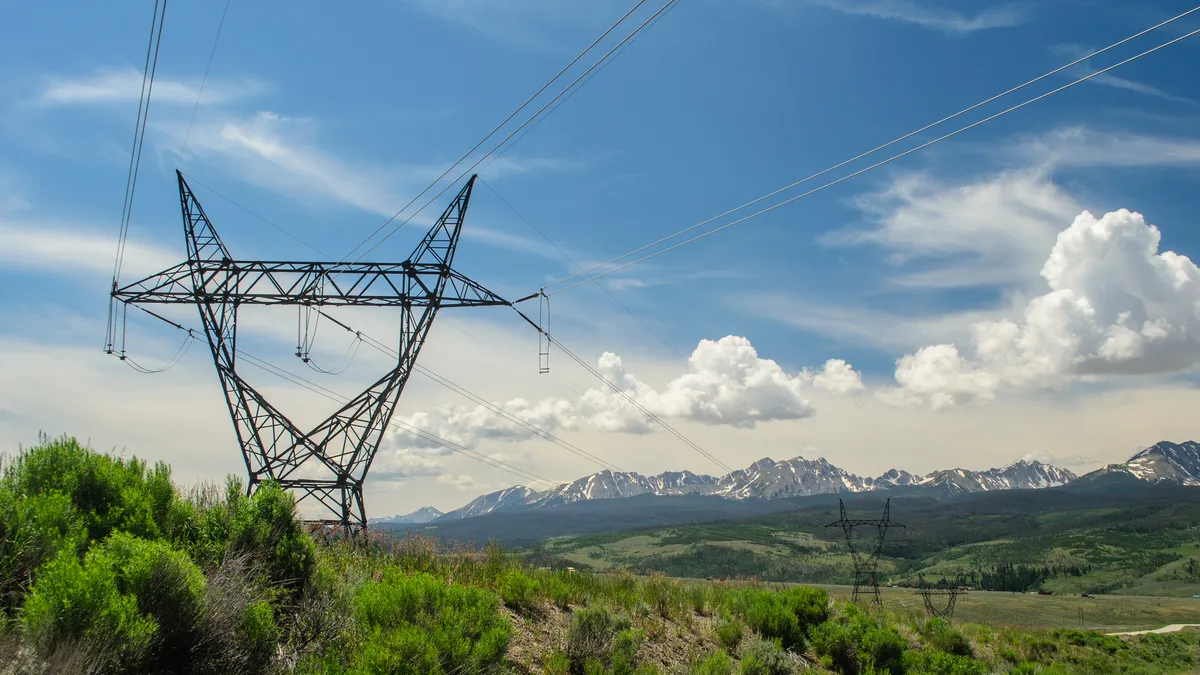Dive Brief:
-
The Colorado Public Utilities Commission last week proposed rules setting a process Public Service Co. of Colorado, or PSCo, an Xcel Energy utility, Black Hills Colorado Electric and Tri-State Generation and Transmission Association must follow to join an organized wholesale market.
-
The utilities would have to show that winning bidders from their resource planning solicitations would have timely interconnection access to the grid, and that the market they join has a greenhouse gas emissions tracking and accounting system, according to the “interim decision.” PSCo and Black Hills would also have to show joining a market wouldn’t delay transmission development in Colorado and would lead to just and reasonable rates for their customers.
-
“The commission is very keen to not lose the Colorado [electric resource planning] process for interconnection rights,” said Vijay Satyal, deputy director of regional energy markets for Western Resource Advocates, a group that is active in the rulemaking process.
Dive Insight:
Colorado law requires the state’s transmission-owning utilities to join an organized wholesale market by 2030, and they are currently exploring their options. They are allowed to seek a waiver from the PUC, if they want to delay joining.
The Feb. 27 proposal, drafted by PUC Chairman Eric Blank, sets utility filing requirements, timelines and criteria the utilities must meet to have an application to join a market approved by the commission. It includes 10 conditions included in the law, such as improving grid reliability, plus several additional ones that reflect PUC policy concerns.
“Consideration of this broader set of criteria — particularly involving interconnection, emissions tracking, [investor-owned utility] customer rate impacts, and IOU transmission expansion — seems appropriate given the concerns identified in this Commission’s [Colorado Transmission Coordination Act] Study, the Commission’s comments to FERC on interconnection, and other state statutory requirements involving GHG emission reductions and resource planning,” Blank said in the proposal.
The proposed rules allow utilities to retain for five years a percentage of the savings that accrue from joining an organized wholesale market, starting at 35% and ramping down to 20%.
Colorado utilities are exploring various market options. They include the California Independent System Operator’s Extended Day Ahead Market and the Southwest Power Pool’s Markets+, an expansive day-ahead market, and RTO West, a potential westward expansion of the grid operator’s RTO footprint.
Tri-State, for example, plans to join SPP’s RTO West in April 2026, according to the interim decision. The wholesale cooperative utility expects SPP will file a proposed RTO West for approval by the Federal Energy Regulatory Commission in mid-2024.
However, as of January, SPP had not meaningfully discussed or addressed how states like Colorado that have carbon emission reduction requirements will track and account for those emissions, the interim decision noted.
Also, Tri-State would have to show that SPP’s current generator interconnection procedures wouldn’t prevent new resources needed to meet Tri-State’s power supply requirements from accessing the grid, according to the interim decision.
Tri-State can effectively provide interconnection to the winning bidders under the state’s resource planning process, the interim decision noted. “In contrast, under the existing SPP RTO approach in the Eastern Interconnection, and really all RTOs, including as SPP proposes for SPP RTO West, Tri-State may not be able to prioritize for interconnection the winning bids in the [resource planning] process,” Blank said in the interim decision.
Tri-State, PSCo and Black Hills are involved in the first phase of SPP’s Markets+, according to the interim decision. SPP expects in the first half this year to ask FERC to approve the market.
In the interim decision, Blank warned that it is not clear how the emissions tracking and accounting approaches in SPP’s Markets+, which PSCo and Black Hills seem likely to join, will be harmonized with the approaches in SPP RTO West.
An initial hearing on the proposal is set for March 5, with comments to be due at a later date. After accepting the comments, the proposal will go to the full commission for review and approval.
“We appreciate the commission's recognition of the importance of organized wholesale markets to help keep power reliable and affordable for our members as we advance our clean energy transition,” Lee Boughey, a Tri-State spokesman, said in an email Monday.
WRA’s Satyal said his group is especially interested in two issues: will the PUC in its reviews consider the seams between different markets and will it assess the cost of not joining a day-ahead market or RTO.
The proposal puts Colorado the farthest down the path of preparing its utilities to join organized markets among Western states, according to Satyal.
The Nevada Public Utilities Commission on Monday held a workshop in its investigation into NV Energy expanding its wholesale market activity and the New Mexico Public Regulation Commission last fall held a workshop on Public Service Co. of New Mexico’s and El Paso Electric Company’s possible participation in a regional day-ahead market or an RTO. The Arizona Corporation Commission has a similar docket, but it has seen little action since 2022.
CAISO is the only fully organized wholesale market in the West, but 21 load-serving entities outside CAISO — such as PacifiCorp, NV Energy and Idaho Power — participate in the Western Energy Imbalance Market run by the California grid operator. The EIM balances electricity supply and demand in real-time, and has produced about $5 billion in estimated benefits since it started in 2014, according to CAISO.















